Sundry Items
Sometimes when I ponder what tiny difference I might make in my efforts to ward off such insurmountable problems as the impending collapse of the biosphere due to global warming or the impending collapse of the economy following peak oil, I feel as if I might as well be reciting a zen koan. Am I making a difference. Can I make a difference? What is the sound of me making a difference?
TP Nation
What can one individual do? It helped to look at the impact of the seemingly, small things we are doing. Take toilet paper. I had no idea that our consumption of TP was a concern until I heard a speaker at the recent Recycling Update Conference. Toilet paper is so lowly compared to 25lb ultra white, office paper, that I did not equate it with virgin forests being mowed down for pulp for the tissue industry.
Yet virgin pulp is being sold to make tissue, from the Canadian Boreal to be exact. Greenpeace and the National Resource Defense Council have mounted a campaign to persuade Kimberley Clark, the world's largest tissue manufacturer, to use a higher recycled content, higher than their current 19% most of which is not post-consumer. Commercial toilet paper, such as that used in public restrooms, has a recycled content as high as 60%. It is the consumer market that commands mostly virgin pulp, for that squeezably soft cushy feel.
Is this a high priority, people? The paper and pulp industry is the third largest generator of global warming emissions and the world's largest user of fresh water. Toilet paper consumption is something that is personally within our grasp to change. There is no huge up front cost to install a roll in your bathroom. Your public image will not be affected by what brand you wipe with. Surely, when it comes down to it, we could easily have unbleached 100% recycled content (80% post-consumer) toilet paper and not mow down any more trees for this two minute one time use.
Consider the data. We North Americans are 7% of the global population and we use, wait for it, nearly half of the world's tissue paper products! Not the usual 25% as with most other resources, but half. This did give me pause as my mind lept to fathom this usage, but I shall just let that amazing fact rest without embelishment.
It is only when I think back to how we lived in Thailand that I realize how Spartan a culture can be with tissue products. Even in public restrooms in Bangkok today, you must buy your (small) allotment of paper from an attendant. Growing up in this land of tropical rainforests, the lack of softwood trees to make pulp meant that alongside the squat toilet was a water jar with a bowl floating in it to dip out water to splash yourself with. Even now, the Thais do not consider toilet paper to do the job properly and a flexible hose with a trigger-operated sprayer is installed next to the modern throne style toilet. Think of the French bidet.
In the pre-amenities, pre-cafe latté England of yore, one found a uniquely utilitarian toilet paper. A strange non-absorbent, glossy paper in a one-sheet-at-a-time dispenser box; something like what you get at the donut counter. This was so culturally sparse, I saved a piece and put it in a frame to show my American friends.
So I was startled to learn from my now favorite Yahoo group, the Compact, that there are Americans - educated, computer owning, internet savvy Americans - living right in this great TP consuming nation, who don't use toilet paper at all. They make do with reusable cloths that they wash after each use. The most elaborate example of this usage was a story told of a homeowner who supplied her family (and guests) with a stack of home sewn flannel cloths about five ply thick. After use, the cloths were put into a lidded pail, much like a diaper pail and washed later with bleach, just as one would wash cloth diapers. (This is why people are addicted to the Internet; to find out these unpublishable facts.)
"Don't get any ideas," Catherine told me.
You won't be seeing any homemade toilet paper at our house, but we do buy the Seventh Generation 100% recycled (80% post-consumer) content toilet paper. Ten years ago when it was only available at a natural food store across town, I would mail order the above by the case to bring down the price. Now you can get it at Whole Foods; their store brand is also of similarly high content. I still buy TP by the case because it's one more thing I don't have to lug home every week.
Landfill Express
While we were entertained to learn about tissue industry practices, the primary focus of the conference was, not surprisingly, garbage. Particularly packaging and non-durable manufactured goods that are destined for the dump almost at the outset. Thus a speaker, from the Product Policy Institute, questioned why our tax dollars should even pay for this corporate clean up.
When garbage was a matter of public health and sanitation, that was a genuine concern to municipalities, but why should government haul away manufactured waste? This garbage does not endanger the public if it is not collected, yet it is 75% of what goes to landfill today. We're paying for stuff to be stored when it is no longer wanted. Government subsidized, permanent, offsite storage.
My clients often have offsite storage units for the stuff that they no longer use. They have trouble getting rid of it because it's not actually garbage in the traditional sense and they perceive it as having value. The goal of manufacturing is to make all of my client's stuff obsolete as quickly as possible and persuade them that they must buy the new model.
The Product Policy Institute no longer wants us to subsidize this waste making manufacturing and is working towards something called Extended Producer Responsibility laws. Once manufacturers take care of their own products then government would only have to handle the recycling of organics. Communities can then achieve the environmentally coveted status of Zero Waste.
Recently, I told a salesperson calling me about a new wireless telephone headset, that I was happy with the headset I had, thank-you. It confused him that, though I appeared to be a headset user and I was willing to talk to him, I didn't want to know about a better product. Nope, what I have is good enough. It was satisfying just to say it.
In fact everything I owned was good enough. I was at saturation level for stuff. This is the death knoll for manufacturers and very bad for the economy we're told. The Great Depression was caused by just such saturation. This was shortly after automobiles became mass-produced. People bought them up like mad. Then every potential buyer had one and boom no more record breaking sales. Oops. We can admit, now, that it's this growth driven economy that's making us obsolete.
Teaching Us To Walk (the Talk)
We can talk about a sustainable economy all we want, but we need to start training people to live it, which was the appeal of Green Mary's message. Green Mary is an entrepreneur who saw a need, or rather something we don't need and proceeded to build a business around getting rid of it. Now that's something worth growing - businesses that disappear unwanted stuff.
Before Green Mary was Green, she was at a presentation given by Julia Butterfly. The world famous tree sitter looked out at the crowd assembled there anxious to save the planet and all she could see were Styrofoam cups, plastic forks and disposable bottles of water. She took them to task for it. Mary heard her and went home in tears, then decided to do something about it. She started with the very Styrofoam and paper cups that Ms. Butterfly found so upsetting. She became a green events planner.
"What I saw," she told us, "was that here we were making people feel good about going to environmental events, but all we were doing was enabling them to continue to use disposables and create mountains of garbage". Hmm. yes enabling people. Am I enabling my clients to store more stuff, so they can accumulate more, I wondered?
Mary took on the challenge of changing people's behavior. Once hired to "green" an event, she spoke to every participating food vendor asking them not to sell any bottled water and to use only compostable paper plates and forks. (See her site for resources). She then set up water filling stations and had the event inform the attending public that they were to bring their own water container. If they didn't they could buy water bottles from vendors. Even though the water bottles might be plastic (steel was preferred), at least they were not designed for one use and would be taken home.
Then she made sure that beside every garbage can was a composting bin with instructions informing the potential user that the plastic looking forks were actually compostable. Volunteers were posted at each bin to help with the concept. Now the eager green public could actually be green and Green Mary continues to spread the message to other events.
I've been at these green events. The composting and acknowledgement for doing the right thing by bringing my own water bottle, utensils and plates is like getting a little gold star (make that a green star). The process builds a sense of shared responsibility by giving us something real to do while listening to concerns about the planet. The benefits are equally real in reduced garbage, better use of resources and further reinforcement of the reduce, reuse, recycle message.
Economic Rehab
In my mother's day, growing up in wartime England, much was asked of the public from giving up their radios and binoculars to rations on food and luxury items. What Green Mary was asking of the public in the microcosm of a one-weekend event, can be asked of the larger community as we face planetary resource limitations. I learned how at another all day workshop given by the Post Carbon Institute.
A number of communities, such as Willits in Northern California, are beginning to transition to living within the limitations of their region. Called economic localization this is a journey that begins with an inventory of a town's resources and supplies, much like a household might inventory what food and supplies are in their cupboards. The community then envisions the future they want (continued stock of food, supplies and services), plans the transition (strategizes sourcing supplies locally) and implements the plan (encourages local food growing, installs solar power for municipal water pumps in case of power outage, etc).
"Humans are meaning making machines" explained Brian Weller in the workshop. Given meaningful information, we are eager to do our part. Raise the bar and we will rise to the challenge.
Jason Bradford, a medical doctor, spearheaded the Willits project enlisted the community with free bi-weekly showings of the peak oil documentary End of Suburbia followed by ongoing discussion groups. By enrolling community members in the process and giving them meaningful data and proven facts, plus a non-partisan, inclusive space, the town of Willits came together to journey to a sustainable future.
Community building provides the glue; we humans are eager to stick together to save what we love for we are longing to be happy with what we have.
Also posted at energy bulletin
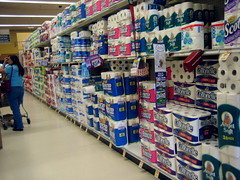
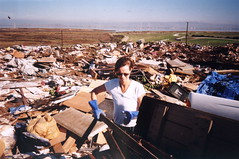
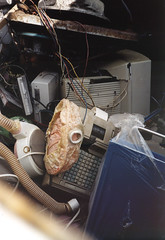
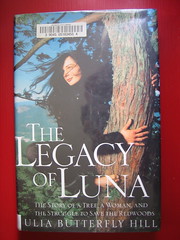
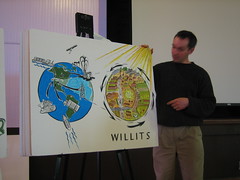




3 Comments:
Hi Amanda
I read your piece on The Energy Bulletin and it bought to mind my stay in Khartoum last May when to my amazement the use of toilet roll seemed to be a criminal offence. Most of the people on the this planet do not use toilet roll (I believe it may be 90%) and the pipe with shower head on the wall did the job.
I did find this difficult to adjust to but once I had it was easy and quite logical, why block the sewage system with unnecessary stuff of any description. In Khartoum it is not unusual for the sewers to collapse - I have seen and smelt the effects and at over 40C I can asure it is not pleasant.
20 years ago lived in a house in North Norfolk (UK) with a cesspit and had a lot to learn about managing the output from our drains and toilet. I was told that using coloured toilet roll was a bad idea as it would not breakdown, consequently I have bought white toilet roll ever since is this still true?
I am installing a new bathroom I think I shall dispense with the loo roll and I know that my and the childrens experience in Sudan will make it quite easy but what about my customers and friends?
You article was informative and appreciated (it made me think) and I would like to draw attention to http://www.eg-solar.de/english/products/products.htm a German schools effort to reduce the burning of wood in developing countries and the reason for my trip to Soba Radi displaced persons camp near Khartoum with a SK14 solar cooker (it was @ 20kg my luggage allowance if anybody wished to do a similar thing take a tape measure, snippers & a small socket set) as gift from my family to a school.
Keep writing!! every little helps.
womabt@trowse.com
Hi Amanda--
I do enjoy your posts, especially this one, re toilet paper, also womabt's comment.
I easily weaned myself off toilet paper 25 years ago in Egypt, where I learnt that a little hosepipe by the squat loo did a MUCH better job than dry paper.
Now at home I squat in the bathtub and use the shower head (on its flexible pipe) to do the same, following up with a tub-cleaning scrupulous job. Cleaner, fresher, cheaper, tree-free and better for our municipal sewage treatment plant.
Barry
Hi Barry,
No wonder Louisa thought I was not living up to my eco-principles when I wrote that Catherine and I would not be forgoing TP; I thought my readers would draw the line there, too, but your example and womabt show me it can be done. I may keep a secret beaker in the cupboard and try it out.
A survey on www.toiletpaperworld.com says that 49% of those surveyed, if stranded on a desert island, chose toilet paper over food as their one necessity. They obviously only asked North Americans. This attachment to TP brings to mind Jared Diamond's book Collapse in which he described how civilizations fell simply because the people refused to accept a substitute for a perceived necessity. For want of a roll of toilet paper the American s were lost....Makes me want to move to Mexico too.
Amanda
Post a Comment
<< Home